Book II, Chapter 17: The Medallion
List of Chapters | Previous Chapter
The welkin had swallowed up the winter sun, so that Hermann could no longer read the manuscript, which Benedikt had so painstakingly composed for him. Rising from the upright log he had been using as an improvised stool, he walked out from under the stable’s ice-fanged eaves to the hitching post and planted one boot on it. He continued to read by the light that had filtered through the gray slow-rolling clouds.
History of the Werewolf of Mariahilf am Inn (continued)
After Melchior’s first visit to his new friends—all that remained of a once proud Waldensian community—he found excuses to return each day, disappearing across the grassy valley and up into the foothills to make the arduous climb along the face of the mountain by the aid of the ropes in the iron rings. His motivations were not entirely unselfish. He was enamored by the girl Élise and welcomed the prospect of marrying her. But the courtship was both unusual and difficult, since neither spoke the other’s language.
The parish priest and elders of Mariahilf would have been scandalized to know what he was up to. But from his point of view, the workings of Fate and Élise’s desperate circumstances had imposed their own logic—a logic that Melchior was only too willing to be persuaded by. He imagined himself his beloved’s valiant paladin; but the ardor of youth had blinded him to his true motivations, which he could not have recognized himself: He wanted to have his way with the girl.
He was frustrated that they were denied the rapture of a solitary moment together. How was it that they could not repeat the conditions of their original meeting (on the chapel bluff), when it had only been the two of them? True, they were physically affectionate when together, to a degree that would have been unseemly in any other part of Christendom, but Élise’s brother was always present. And when Théophile was called away, either to attend to his dying father or to complete some menial chore, Élise’s mother assumed the role of dueña, monitoring Melchior’s every move out of the corners of her craven eyes.
Melchior refused to tell his father where he was disappearing to each day. But the stonemason, who had seen much of life, deduced from the lad’s flushed face and distracted manners that a girl was involved. He cautioned Melchior that, if he were not careful, he might find himself burdened by obligations ordained by God that could cast a retrospective pall over the memory of whatever liberties he was presently indulging in. Offended by the boldness of his father’s pronouncement, the boy had chucked his trowel in the bucket and ran off into the woods.
On the last day of June, 1738, the Waldensian patriarch quietly passed away on his cot. His ragged clothes were stripped from the corpse; and the naked corpse was abandoned on the floor of that interlocking network of wind tunnels located at the foot of the promenade fronting the ample spaces that had once served as the Waldensian notables’ residences. Théophile disassembled the cot and took it back to his own cell to use.
Two days after the terse obsequies were fulfilled, Élise, Théophile, and Melchior gathered beneath the vaulted arch at the opposite end of the ceremonial way, watching in silence as a murder of crows flew into the wind tunnels, some emerging with strips of flesh clinging to their beaks.
The three had been working together to seal (with nets and thick carpets) the accesses leading into the columbarium to prevent the crows from feasting on the doves. Melchior could not understand the siblings’ disinterested response to the spectacle playing out before them.
Élise leaned her head casually on Melchior’s shoulder and whispered earnestly in that dialect of French that had been fossilized in this mountain fastness. Théophile translated. “She saw Papa last night in a dream. He laughed when he saw his carcass.”
“I can’t believe,” Melchior sneered, “that you’re letting the birds defile your father’s remains in this manner.”
“I’ve told you before that we do not revere the temple once the spirit has abandoned it.”
Despite his horror, Melchior passionately stroked Élise’s chestnut hair and emitted a sigh. He felt Théophile’s eyes boring into him.
“What?” Melchior said churlishly.
He assumed that this demonstration of affection had offended her brother. But that was not the case at all; rather the mention of “abandoned temples” stirred up a thought.
“Élise tells me you and your father are restoring the chapel in the valley.”
“Yes. What of it?”
“As long as our people have lived here, the hill on which it stands has been where the wolves resort to in the rutting season.”
“I’ve heard them howling on the bluff in the winter and spring,” Melchior said. “It’s their nature to seek out high places. It has nothing to do with the chapel.”
“But where are their dens? Where do the she-wolves litter and bring forth their cubs?”
“I don’t follow.”
“Wolves are not native to this part of the Tyrol.”
Melchior sniffed. “They eat chickens and attack other livestock in Mariahilf all the time.”
“But have you ever seen one? Do the hunters ever find them?”
Melchior shrugged. “I don’t know.”
There was a whirl of black wings as two birds soared out of the cave with a length of the dead man’s entrails clutched between their talons.
Although the chancel wall had been primed early in the summer, father and son turned their attention to reconstructing the steeple and belfry tower, which had not had a bell in it since the previous one had been melted down at the time of Charles V to cast balls. When they completed all the external work, they prepared for the finishing touches within.
On the third day of November, Melchior’s father used drew the outlines of a simple cross on the east wall with a piece of charcoal. “I’ll fill it in with brown paint,” he said. “And then we’ll add some vines around the edges and maybe a communion cup and whatnot.”
Melchior asked if he could try his hand at a figurative representation of a saint praying—maybe in the corner. That way, if it did not turn out well, they could simply re-prime that section.
The barrel-chested man seemed agitated. “I suppose so. But I want to have this done by Christmas. There is a reason I am not painting an image of Christ on the cross. If it were to come out poorly, it would diminish the rest of the work you and I have put into it over the past months. We have breathed new life into dry bones. And we have done it all for the glory of the Lord, Melchior. Not to gratify our own vanity.”
“I understand, Papa,” the boy replied.
But over the next four days the stonemason hovered curiously over his son’s shoulder, gasping in amazement and whispering words of encouragement. The image was smaller than the span of a man’s hand, but the details in the hair, the robe, and the facial features were astounding. Melchior had become so absorbed in his work that he ate and slept in the chapel, and forgot about his lover in the mountain.
When Melchior had finished with the saint, his father summoned Father Holzer to the chapel. The priest looked at the image, then at Melchior; then again at the image; and addressed the stonemason in astonishment: “Your boy did this?”
“Yes, Father.”
“By himself?”
“Yes.”
The priest smiled at the young artist. “How did you get these colors?”
The boy pointed to several planks of wood, now stained with splotches of paint. “I mixed some powdered tints together and bound them with linseed oil. And I found new hues by experimenting.”
The priest clapped his hands together. “Die ganze Welt ist heilig (the whole world is holy)! This is miraculous! My boy, do you think that you could reach into yourself and cover the wall with a mural of Our Lady of Mercy?”
“I shall try, Father Holzer.”
The priest raised his finger because an idea had come to him. “Melchior, your father and I shall travel together to Innsbruck this evening. We will be back by Sunday. We will bring with us fresh paints and any other supplies that you feel you might need to continue your work through the winter.”
The day after the priest and stonemason departed for Innsbruck, Melchior returned to the Waldensian hideout. Élise was overjoyed to be reunited with her lover. Théophile asked where he had been and Melchior explained what had taken place. “Then it is as my father foresaw,” Théophile said.
He translated what Melchior had said to Élise. But there was an edge to his voice.
“I did not mean to sound so vain, Théophile,” Melchior said. “You too are a marvelous painter.”
“It is not your talent that I was thinking of,” the boy replied, no longer translating to his sister. “Why do you plan to paint the Mother of God. . . there?”
“Please don’t patronize me. The chapel is a holy place. I have treated your family and your faith with due respect. I ask you to accord me the same courtesy. I think it presumptuous of you to imply that, because your ways are different from mine, they are more godly.”
The Waldensian boy muttered something to Élise. With downcast looks the girl went away to find her mother. Théophile gestured for Melchior to follow him. They walked through the caverns until they reached the carved basin on the edge of the cliff where the rainwater was collected. A thin layer of ice had formed on its surface.
“Last night it snowed,” Théophile observed. “The ropes and footholds along the face of the rock will only become more treacherous from this day forward. I would ask that you not return until the spring thaw.”
“This makes me sad,” Melchior said. A tear rolled his cheek. “Am I not to see my Élise until then?”
“Please don’t be sad,” Théophile said, absently touching one of the cruciform scabs on his face. “We shall see you next year. I have never had a friend, Melchior. It is a very good feeling. Please understand my predicament. I am the head of a dying household—of a dying people. I shall be spending the winter trying to persuade my mother and sister to leave the mountain with me. There is nothing left for us here. If you were to become my brother-in-law, then perhaps you could help us find acceptance among the villagers of Mariahilf am Inn.”
Melchior embraced Théophile. “I will vouch for my wife and her family.”
“Will you marry Élise in the spring in accordance with our rite?”
“Yes.” Melchior seemed puzzled. “But she must be married to me under the Catholic rite as well.”
Théophile contemplated the gorge below, as if he saw something among the rocks that he dare not confide to Melchior. “We’ll discuss the matter further in the spring.”
Father Holzer permitted Melchior to sleep in the chapel through the winter, and to keep an iron brazier on the altar in order to heat the building’s confines. The boy worked continually, using a ladder and a scaffold that he had erected near the wall. Each evening the stonemason checked on his son to ensure the prodigy had plenty of fuel and candles; and was otherwise comfortable and well provisioned.
On a hag-ridden night in the heart of December, Melchior was on the ladder touching up the edges of the Virgin’s robe by the light of a lantern hanging from a peg. He was exhausted and his eyes burned, because his brain wanted him to go to sleep. He stood balanced on the middle rung, listening to the wind gusting through the belfry.
Suddenly the latch of the front door was released and both folds swung open. A man’s shadow rose up before him, eclipsing the light shining on the mural. He assumed it was his father, who had visited earlier to fuss that Melchior was not drinking enough wine to keep his limbs warm.
The door was still open. The wind rattled the brushes in the cups; and made the white tarp flap and the scaffold creak and groan.
“Shut the door!” Melchior said, drawing his hand away from the image so his brush did not smear the paint.
Obedient to his command, the door slammed shut. But when Melchior stepped down from the ladder and turned, no one was there.
“Who’s there?”
There was no response. He raised the lantern from the peg and walked down the middle of the chapel, flooding the darkness beyond the Romanesque columns with the flickering candlelight. Behind him he heard the sound of crumbling masonry. He wheeled around and saw a vertical rift form on the side of the ancient altar. Something glinted inside it.
He returned to the altar and bent down to inspect it. A medallion hung from a slender chain. He reached inside and felt upward, searching for the hook the chain hung from. He found it. But it felt like a canine’s tooth; and the tooth seemed lodged in a moist hot mouth. A hot breath exhaled on his hand. He screamed and fell backwards in alarm. The medallion fall to the floor with the chain intact.
Melchior reasoned that his fatigued and overworked imagination had transformed the harsh wind’s effects (and what was admittedly a bizarre coincidence) into a waking dream full of supernatural improbabilities, concluding with his snapping out of it and finding himself on the floor confronted with a very real and tangible phenomenon—some keepsake secreted into the altar long ago.
His fingers worked over the embossed wolf’s face on the front of the medallion. He thought at first that it was made of a cheap metal tarnished by the ages. But he knew enough of metals to tell that this was electrum. It was obviously ancient and doubtless worth a lot of money. He thought of that final conversation he had held with Théophile in which his friend had confided to him his willingness to leave the mountain but his concern that the villagers of Mariahilf might treat them with malice and suspicion. Melchior did not know how his marriage to Élise would be received. But as he contemplated the relic he thought that, if were to sell it in Innsbruck, it might yield enough for him to emigrate from the Tyrol with his new wife and her family. And maybe Papa would join them.
With these thoughts roiling about in his brain, he removed his work clothes, put on his nightshirt and, leaving the chain around his neck, snuggled up under his blankets by the smoking brazier and drifted off to sleep. In his dream he heard again Théophile telling him that the bluff on which the chapel stood was where the wolves went to rut in the winter and spring. He felt himself in the thralls of lust, sprinting naked through the misty valley over grass grown brittle with frost. Now he was a wolf running on all fours.
He reached the top of the hill where the chapel should have been. But in its place stood an open-air atrium. Between the columns around the square shrouded witches bore torches and chanted. On her hands and knees before the altar that occupied the center of the courtyard was Élise. Her back was arched and her hips swayed. She wore nothing but the medallion.
Melchior lifted his muzzle and sniffed the ripeness of the engorged flesh between her legs. He covered her; and, as he did so, she transformed into a she-wolf. Amid the fierce and energetic thrusts, he bit deep into the bitch’s neck and greedily lapped up the blood with his tongue. Her howls of agony were replicated by the chorus of shrouded women at the edge of the square.
Melchior awoke, exhilarated. But as his senses sharpened into focus, he drew his knees to his chest and curled up into a ball of abject shame. His guilt was compounded by the consequences of the nocturnal emission that clung oozily to the frayed edges of his nightshirt. But when he experienced no more nightmares after that night, he resumed wearing the medallion around his neck, instead of keeping it in his pocket.
One day as he was washing himself shirtless in his father’s presence, the stonemason asked why he was wearing a necklace. Melchior became evasive and responded that it was a gift from a girl he fancied. His father rolled his eyes and spoke of the matter no more, thinking the object nothing more than a cheap tin trinket.
Not long after, Melchior approached Father Holzer after Sunday Mass and asked if he could speak to him in confidence about an urgent matter. The priest realized the boy wished to make a confession. The church of Mariahilf was not equipped with a confessional booth, so the two sat together in the front pew once the congregants had dispersed.
The boy spoke obliquely of the lewd dream and how his body had responded to it. But he refrained to mention the medallion, or the fact that the dream had taken place in the chapel on the hill. Father Holzer exhibited tokens of discomfort. But imposed five decades of Ave Marias and was on the verge of rising from the pew when Melchior stayed him with a subtle gesture of the hand.
“There is something else I would like as you, Father.”
“Yes?”
“Are the Waldensians heretics?”
“Goodness. Where on earth did you hear about them?”
Melchior became sullen. “I met a Frenchman up on the mountain. He says that he and his family are Waldenses. He claims they are Christians like us.”
Father Holzer smoothed his cassock. “He spoke truly. They are Christians. But of a different sort. Like Lutherans. Hundreds of years ago the Waldensians were persecuted for their beliefs. But not anymore.”
“Are they heretics?”
“That is an ugly word. Christ teaches us to love those with whom we disagree.”
“Christ teaches us to love our enemies. So you are implying the Waldensians are enemies of God.”
“Melchior,” the exasperated priest said, putting one hand on the boy’s shoulder. But then he gasped and drew away. A gout of blood had appeared on his finger where he had touched the medallion’s chain. “Strange. . .” he said. “You must have had a splinter stuck in your collar.”
As the days passed, Melchior’s features hardened and grew quite lean. The talk of the village was that the stonemason’s son was pushing himself beyond his endurance. But despite his haggard appearance, Melchior had never felt stronger in his life. He finished the mural by Palm Sunday, but the formal unveiling was to be delayed until Ascension Day when the Jesuit delegation from Ingolstadt was expected to be in Mariahilf.
Melchior burned to see his lover. On a drizzly afternoon in April 1739, he hiked up the foothills to that boulder that stands on the brink of an abyss. The rain had accelerated the melting of the snow. He brought with him a knife to chip away at impacted ice along the cliffs that might thwart his way. One of the two cables in the first iron ring had snapped off, but the other was intact. And when he tugged at it, it felt sturdy. He wondered if he should risk making the journey with only a single rope between him and imminent death. The thunder rumbled overhead.
I shall go on.
He gripped the rope and placed both boots onto the damp foothold until he had reached the first rocky projection, awash in clumps of slush. He slipped but instantly righted himself. Within minutes he had made it to the second shelf; and finally to the last, which became narrow as it snaked its way around a bend in the mountain before widening again into a ramp leading up into the Waldensian caves.
No one greeted him despite his calls. But his voice had disturbed the doves in the columbarium. Some of them flew out and flocked together before returning into the mountain when a clap of thunder rent the sky. He saw tapers flickering in the recesses deep inside the mountain, which the leaden sky had cast into shadows. He went to that broad stone basin where the rainwater was collected.
“Théophile! Élise! Where are you?”
Théophile appeared at an arch inside. His mother joined him. The boy wore no shirt. His mother had on only a soiled shift.
“What’s going on?” Melchior asked. “Where is Élise?”
“In there,” the boy said, signifying by a inclination of his head that his sister was in the room behind him, which was ablaze with lights.
Melchior was perplexed. “Is she alive?”
“Yes . . . I don’t know.”
“What do you mean?”
The boy shook his head.
“Where is your shirt?” Melchior asked as he approached.
“The wound won’t heal.”
Melchior forced his way between Théophile and his mother.
He stepped into the chamber whose main wall is decorated by a mural of a chalice surrounded by images of the saints and other holy personages. Élise backed into a corner, her face crisscrossed with claw marks. She was trembling. A fresh bandage had been wrapped around a gash running from her neck to her shoulder, where something fanged had bit into the flesh. The cloth was soaking up the blood before Melchior’s eyes.
The siblings’ mother lifted a heavy basket full of drenched garments and carried these out of the room.
“My sister cannot die,” Théophile said in an acerbic voice. “She cannot eat. She cannot sleep . . . And she is pregnant.”
Melchior looked at him in awe. “Then she has got the child by you!”
“How dare you say that, Melchior!—How dare you!” Théophile shook his head in impotent despair. “Do you not recall the night in December, when the winds howled fiercely and carried within their folds the laughter of the damned?” His eyes became wild. “Élise screams. I run from my cell to hers. I find you standing at her threshold (without a stitch of clothing on). In the light of the full moon your skin is black with blood—from your chops to your shins. I call out to you. But you ignore me. And then, with an inhuman velocity, you run down the icy ramp; and (in defiance of the physical laws of nature), you spring around the corner and are gone.”
Melchior covered his ears.
“I see by your looks,” Théophile scowled, “that you know what of I speak.”
“Melchior,” Élise said in a weak voice.
Her mother stepped again into the room, holding between her hands a ceremonial stone chalice filled with water.
“We have kept my sister in this nuptial chamber, waiting for your return.”
Melchior bared his teeth. “You speak in riddles, Théophile.”
The Waldensian boy accepted the chalice from his mother, and prayed over it. He handed it to his sister, who tried to drink from it, but the liquid trickled out of the hole in her throat.
“You have stolen my sister’s honor,” Théophile wept. “You will restore it by sealing your marriage with her, and drinking from this cup.”
Melchior looked again at Élise, the girl who had marked him from the time he was a boy to be her mate. How could she have done this unless . . . But despite his doubts, he raised the cup to his lips and drank.
It was blood. He dropped the chalice and as it struck the floor it cracked and the floor trembled. Melchior wiped the gore from his chin and stared at the viscous stain beneath his feet.
“What have you done to me?”
Théophile and Élise looked at each other in bewilderment.
“It is only water,” Théophile said.
“You are witches—All of you!”
Élise sobbed and her mother ran to comfort her. But the noise that the girl made sounded in Melchior’s ears like the whimper of a wolf. “I should never have come to this place. . .” He whispered. “You lied to me. You told me you were Christians. But I see now that you are servants of the Devil. You have put a curse on me.”
Melchior grabbed the medallion and tried to tear it off his neck but the chain would not yield. So he lifted it up over his head and hurled it into a jagged rift that had opened in the floor of the room.
Élise swooned.
Melchior pushed Théophile aside and fled the chamber. Lightning quivered on the horizon as he reached the edge of the cliff. Here was where Théophile and he had held their final conference before the winter had settled in. He recalled how the Waldensian boy had contemplated the rocks and screes in the gorge below.
“Melchior!” Théophile shouted, seizing him by the shoulder. “It is you who has put a curse on us! You were the only friend I ever had. My sister chose you to be her mate for all eternity. How could you betray us in this way?”
“Yours was the first face I painted on the chapel wall,” Melchior said, rising to his full height, and pushing Théophile from the cliff. As the boy plummeted to his death, he made no sound; but simply closed his eyes and pressed his palms together in prayer.
Melchior looked over his shoulder. Élise and her mother stood together in mute shock. Without a word, Melchior descended the ramp and rounded the corner, as the keening of the two women began.
He returned the way he had come; along the cables. But on reaching each ledge, he removed his knife and (where feasible) cut the ropes from the rings. I have purged the mountain of an ancient heresy, he thought. This den of werewolves is no more.

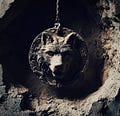


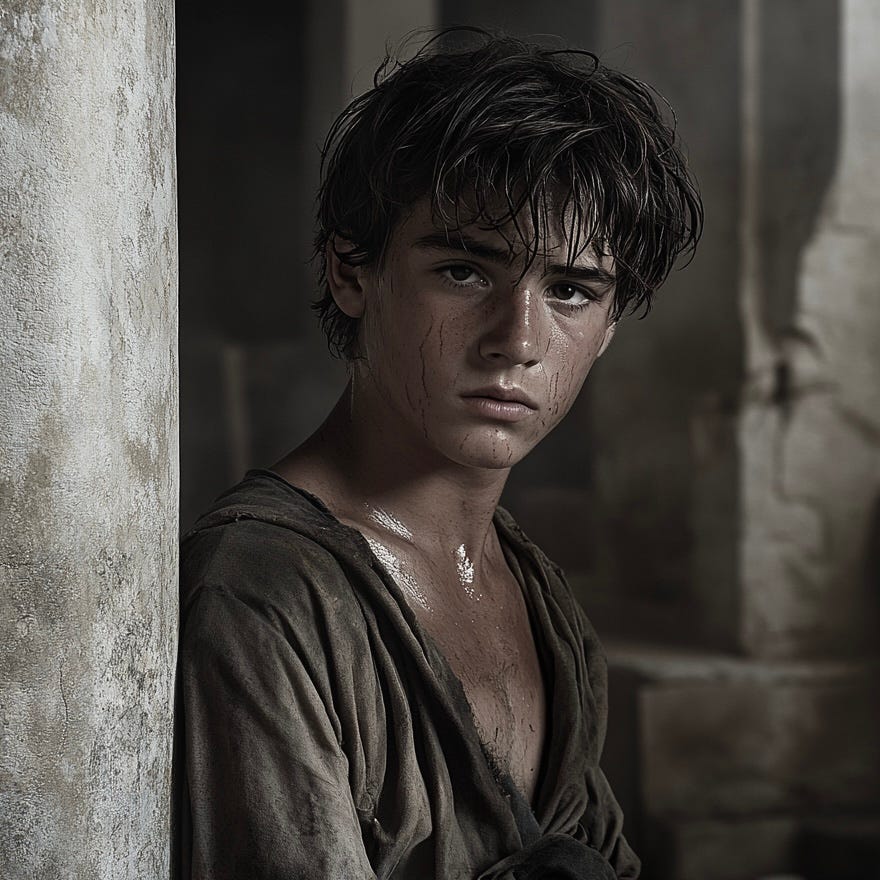
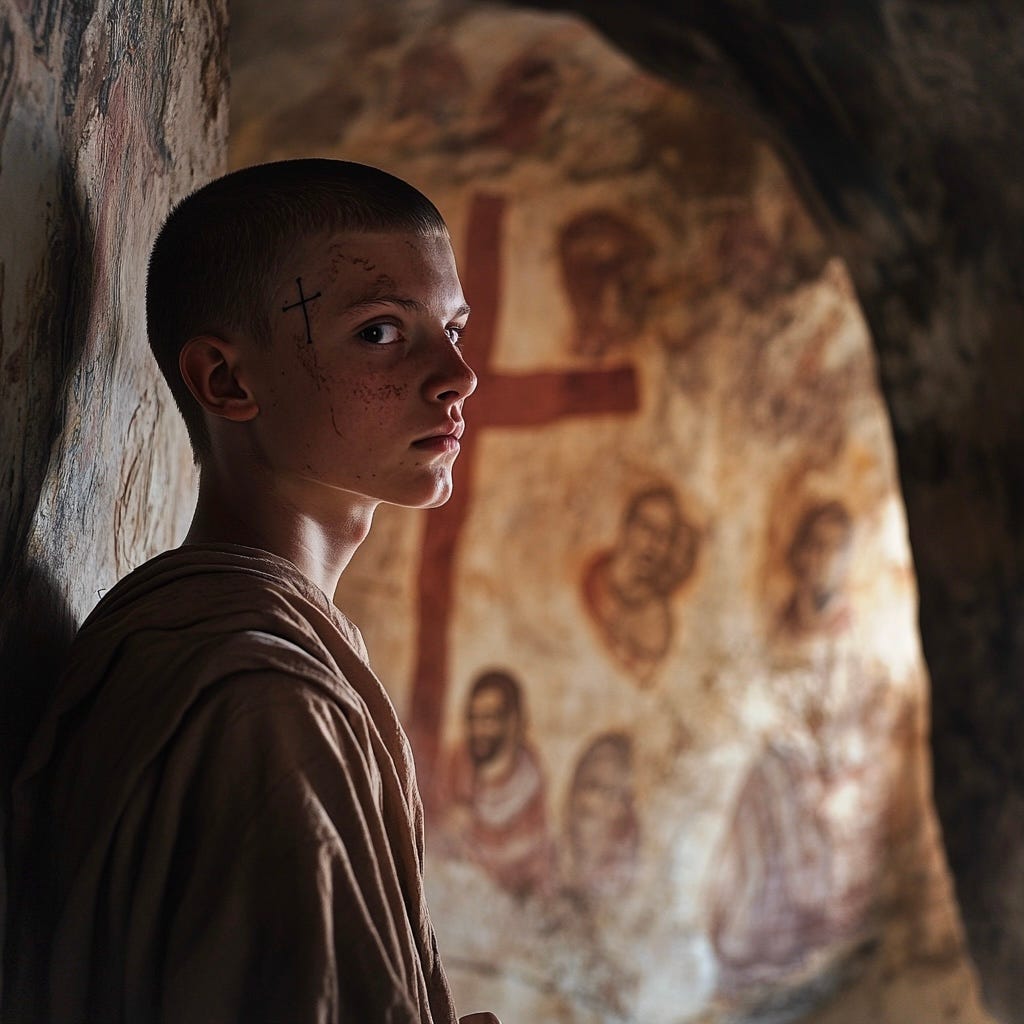

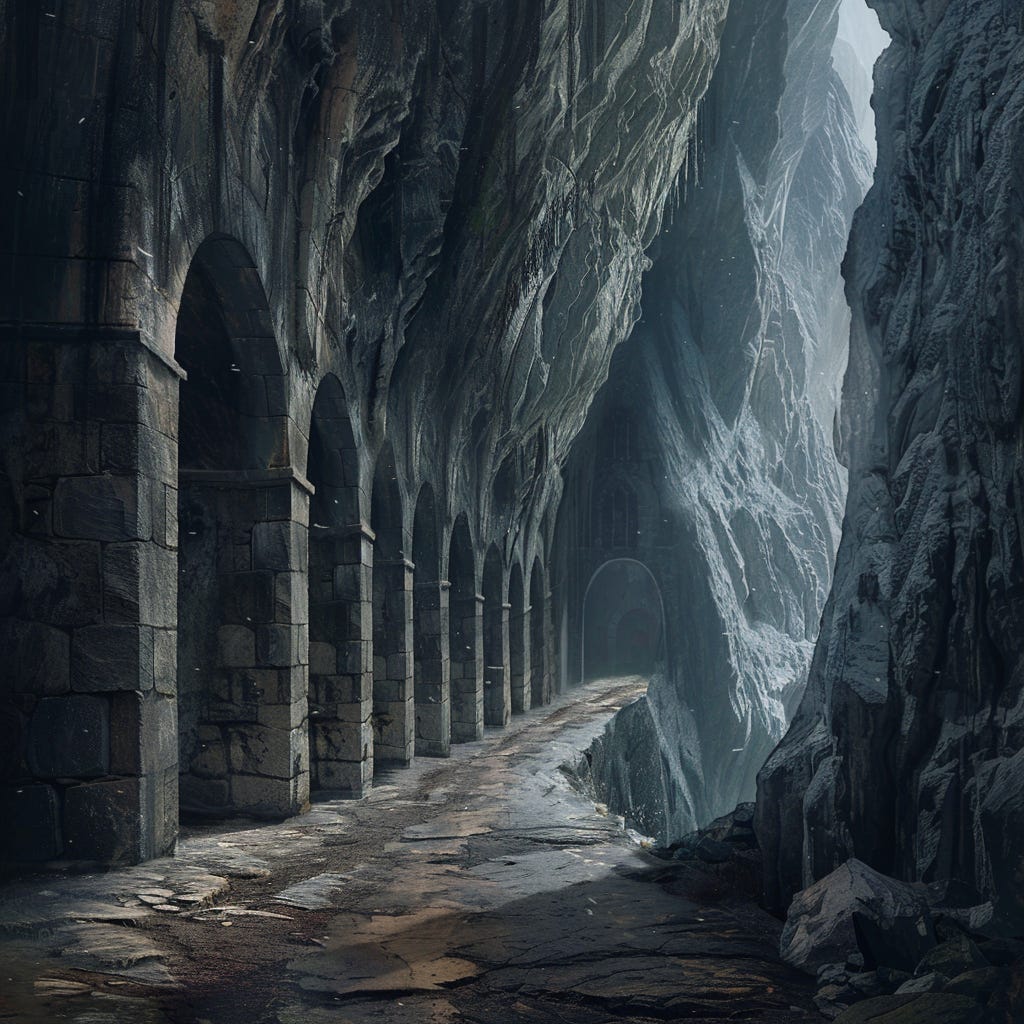
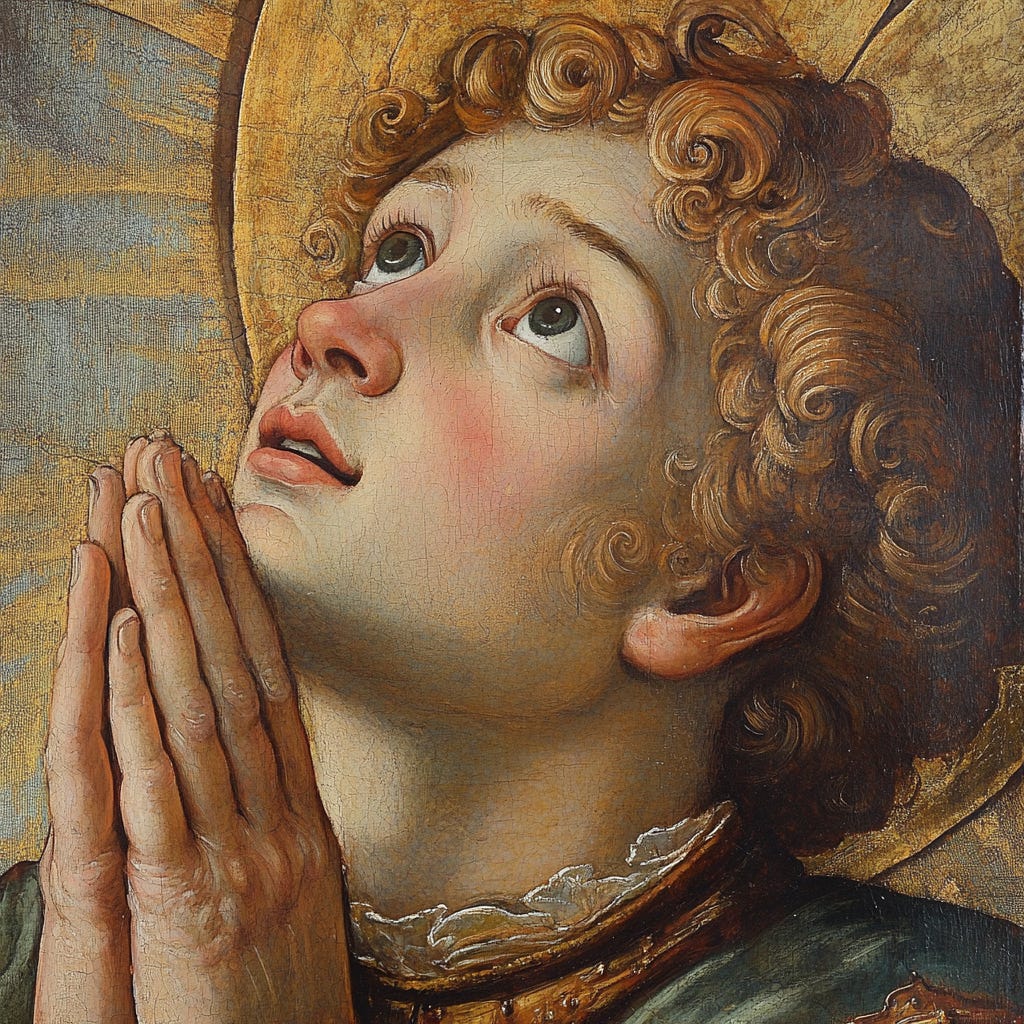
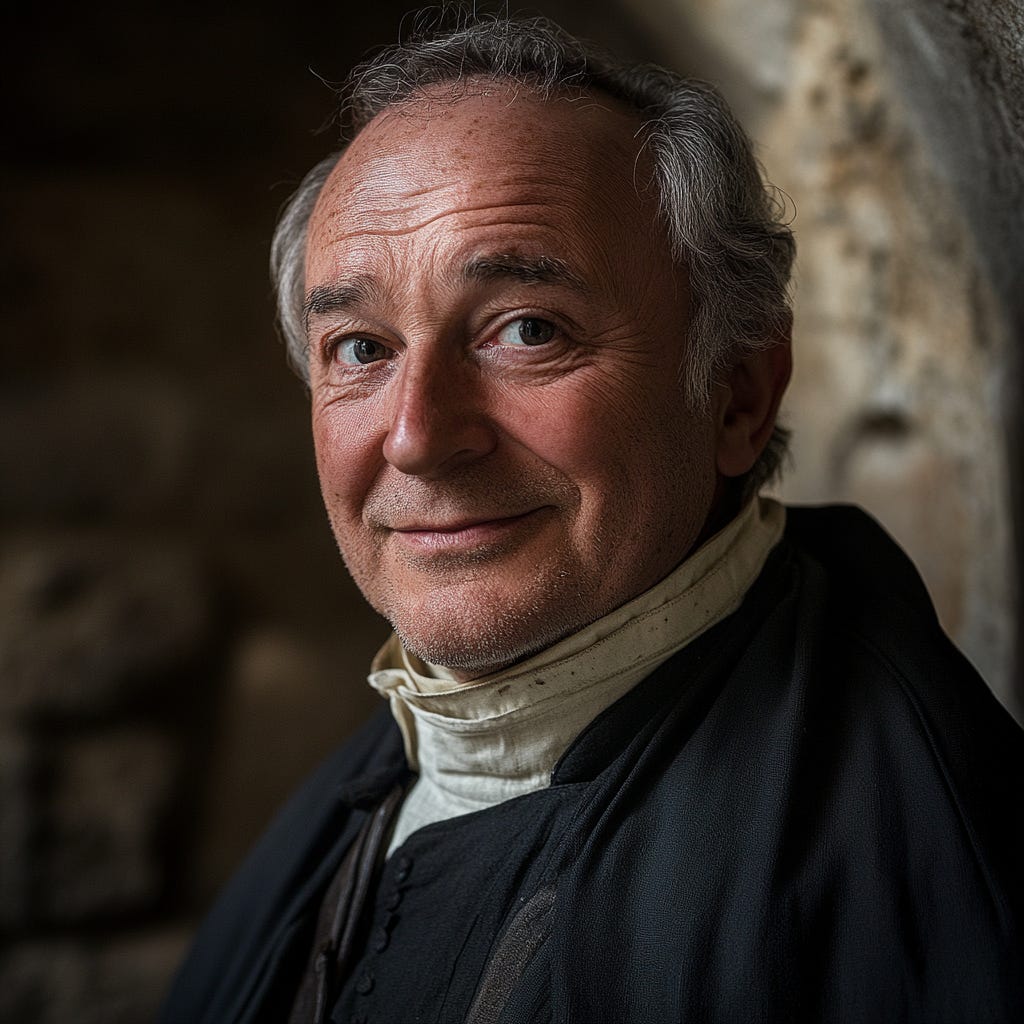
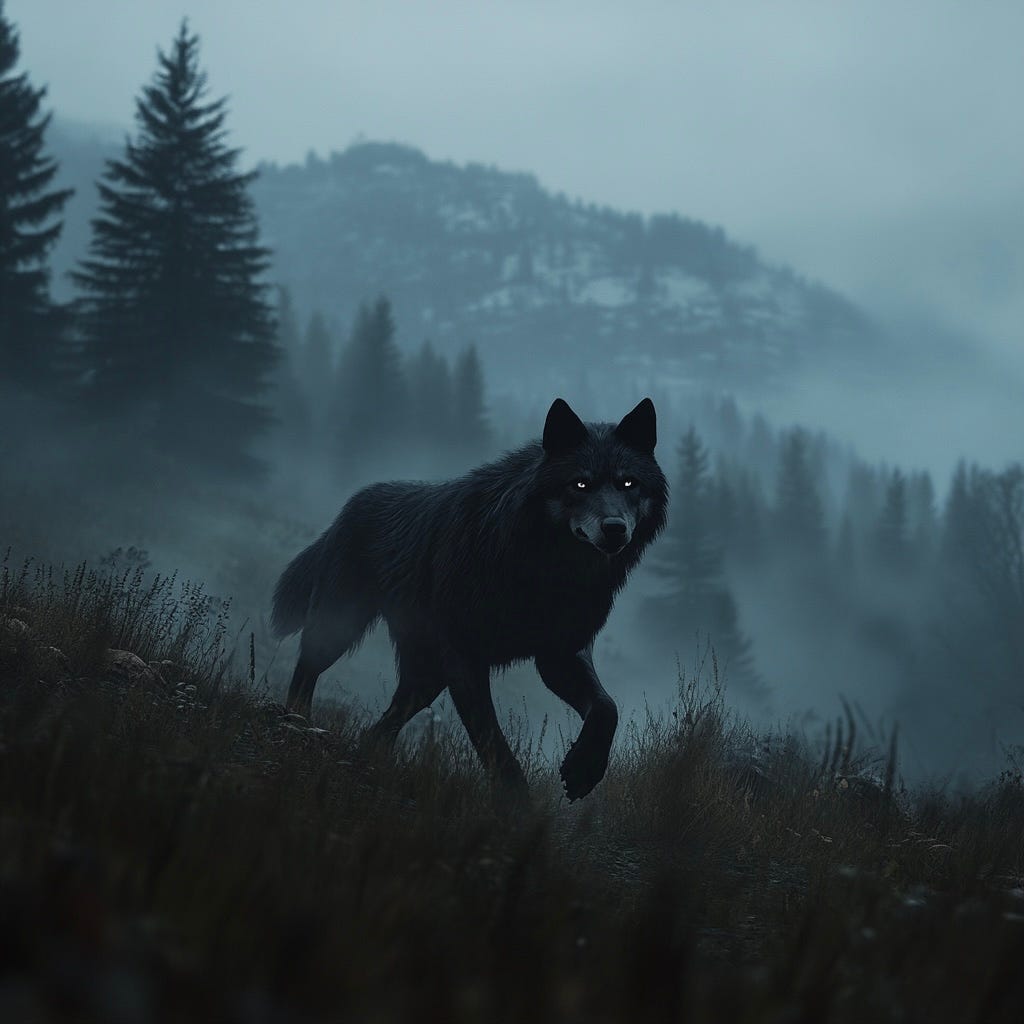



So last chance warnings went unheeded and a werewolf finds a host and a mate...